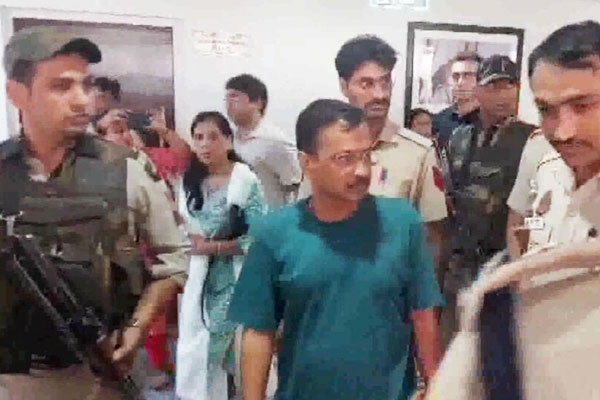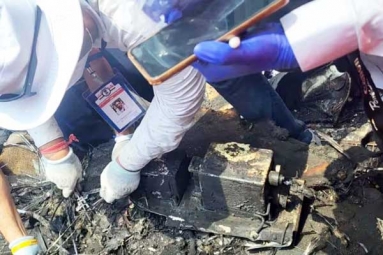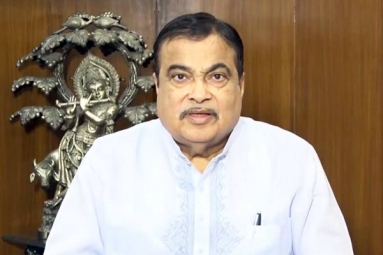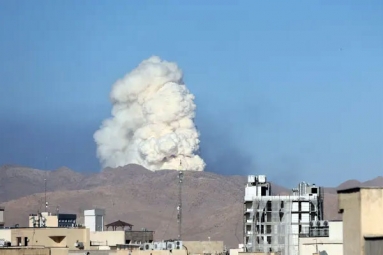
(Image source from: Twitter.com/ANI)
Arvind Kejriwal, the prominent political figure, has been apprehended by the CBI within the premises of Delhi's Rouse Avenue Court, in connection with the alleged liquor policy case. Shortly after, he withdrew a petition filed with the Supreme Court, challenging the stay on the granting of bail imposed by the Enforcement Directorate in the same case. This withdrawal was facilitated by the ED's lack of objection, allowing Kejriwal to pursue a more substantial appeal against the High Court's decision to uphold the Rouse Avenue Court's bail order. Kejriwal's legal team argued that the agency's decision to arrest him at this juncture demonstrated a biased approach, given that he had already been extensively questioned for nine hours in the previous year, being treated as a witness in the case. The defense emphasized the stark contrast between a "poor citizen" and the "might of the State," noting that the case had been ongoing since August 2022, during which time Kejriwal had cooperated fully, only to be subsequently transformed from a witness to an accused party without any further notice from the CBI.
The accused, Mr. Kejriwal, requested a 24-hour delay to review the CBI's case, but the agency argued that the allegations were not unnecessary and that they were not obligated to announce the start of an investigation. The CBI explained that they only needed to inform the court when they needed custody, not the other party. After Mr. Kejriwal's arrest in court, his party issued a strong statement, accusing the BJP of hatching a conspiracy to arrest him in a fake case, but they asserted that the truth would prevail. The Delhi Chief Minister's situation has seen a notable change since the Rouse Avenue Court granted him regular bail last week. The Enforcement Directorate swiftly appealed the lower court's "distorted" and "deeply problematic" bail decision before the High Court, just hours prior to the defendant's scheduled release from Tihar Jail. The High Court promptly issued a verbal order to temporarily suspend the bail, and subsequently proceeded to the Supreme Court, seeking to overturn this stay.
The top court respectfully declined the request. The Supreme Court acknowledged the High Court's actions as "unusual", with Justice Manoj Misra remarking, "In stay matters, orders are typically made on the spot, not reserved. What happened was out of the ordinary." However, the court indicated it would be improper to interfere, as the High Court had reserved its verdict. The court responded to Mr Kejriwal's arguments - that the High Court erred in staying his bail without fully reading the order of the lower court - by stating it would wait until the said order was available, and the High Court had a chance to re-examine the stay, before ruling on his plea. True to its word, on Tuesday, the High Court issued its final order. Regrettably, the outcome was not favorable for Arvind Kejriwal. The High Court argued that the lower court - the Rouse Avenue Court - "failed to give proper consideration" when granting bail, pointing to what it deemed were lapses in judgement. These included not providing the prosecution adequate time to argue the application and neglecting to properly discuss the conditions for release under the Prevention of Money Laundering Act, the law under which Mr Kejriwal was charged.
The High Court emphasized the need for careful consideration of the main petition, which challenged Mr. Kejriwal's bail order. The court found that the lower court had failed to discuss Arvind Kejriwal's vicarious liability under Section 70 of the PMLA. As a result, the court ruled that Mr. Kejriwal would remain in jail following his arrest by the ED in March. Earlier this week, in the top court, the AAP leader argued that the "balance of convenience" was in his favor. His lawyer, senior advocate Abhishek Singhvi, stated that if bail was reversed, Mr. Kejriwal would go back to jail, as he had after the Supreme Court's interim release. Singhvi also referred to the order granting Mr. Kejriwal interim bail, which acknowledged that he is not a "habitual offender" and has no criminal history. Mr. Kejriwal had asked, "Why can't I be free in the interim? I have a judgment in my favor." Last Thursday, the Rouse Avenue Court granted Mr. Kejriwal regular bail.
Individuals who viewed the occurrence can provide valuable information about what transpired. Their accounts, though subjective, offer crucial insights that can contribute to a more comprehensive understanding of the event. These eyewitnesses hold the key to piecing together a more complete narrative, as their first-hand observations and perspectives can shed light on aspects that may have been overlooked or misinterpreted. By listening to and carefully considering the testimony of those who were present, we can gain a more nuanced and accurate representation of the situation, ultimately aiding in the pursuit of truth and justice.
"The circumstances must be so closely connected that they lead to guilt. Statements by tainted people discredit the prosecution. ₹100 crore was from the Southern Group. There is no evidence. There is no evidence,” he said. The ED had arrested Mr Kejriwal for money laundering during the drafting of the Delhi Liquor Policy 2021-22, which was later withdrawn after the Lt Governor raised red flags. The ED alleged that the money Mr Kejriwal and the Aam Aadmi Party received from liquor vendors - about ₹ 100 crore - was used to fund the party's election campaign in Goa and Punjab. Both Mr Kejriwal and the Aam Aadmi Party have rejected the allegations, calling them a political vendetta. Despite months of searching, the ED is yet to find the alleged bribe.





















